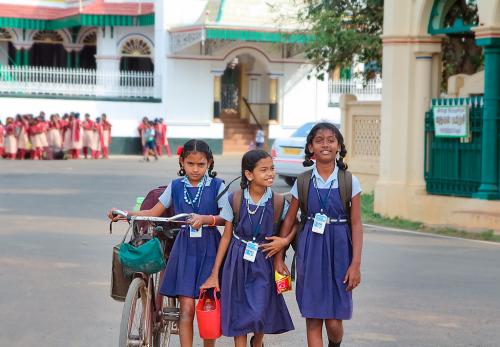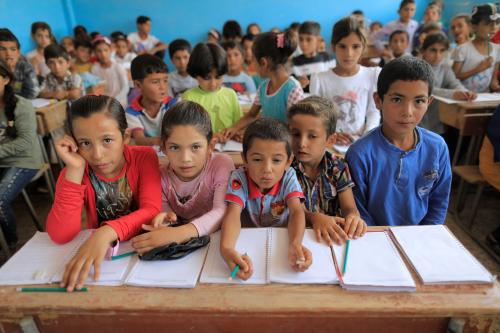On May 15, 2020, the Michael & Susan Dell Foundation and Central Square Foundation (CSF) co-hosted the “Education in the Times of COVID-19: Challenges and Way Forward” panel discussion as part of the Charcha 2020 Forum in India. The event brought together practitioners, thinkers, community leaders, and policymakers to explore development challenges across multiple sectors, including education. This year’s forum focused on the COVID-19 pandemic, and the session in which I participated examined its impact on education systems across the globe while also exploring the role of innovative finance in education more generally.
At the Center for Universal Education at Brookings, we research how innovative financing can bring both more and smarter funding to address the global learning crisis. The panel discussion provided an excellent opportunity to share our research and learn about a range of innovative financing mechanisms currently in use. These mechanisms comprise both innovative sources of financing, as well as innovative ways of delivering funding that incentivize outcome achievement.
Blended finance, which refers to “the use of catalytic capital from public or philanthropic sources to increase private sector investment in sustainable development,” was key to the discussion. Sandeep Aneja of Kaizenvest discussed using blended finance facilities to drive performance-linked rewards in partnership with private debt to achieve self-sustaining private education systems. Steve Hardgrave of Varthana, in partnership with the Dell Foundation, also presented a for-profit model of providing loan capital to affordable private schools in India with loan forgiveness tied to outcome achievement.

Maya Ziswiler of the UBS Optimus Foundation (UBSOF) presented on innovative ways the education sector is using both blended finance and outcome-based financing. For example, UBSOF’s investment in education social enterprises with Acumen in East Africa provides loans and equity investments coupled with a grant for pre- and post-investment support and an outcome-based incentive for both the investment manager and the investees if outcome targets are reached. Another example mentioned for supporting education social enterprises was impact loans, where the interest rate fluctuates based on the outcomes achieved. The interest on the loan has a sliding scale which decreases as learning outcomes increase.
A third innovative financing mechanism for the education sector is income sharing agreements (ISAs) for young people who cannot afford tuition fees in high-quality higher education. Once graduates start working and earn above the minimum income threshold, they make income-based repayments for their loans. The students’ employment outcomes demonstrate the benefit of the education.
I presented on social and development impact bonds (SIBs and DIBs), a form of outcome-based financing where investors provide up-front capital to service providers with the opportunity for a return if agreed-upon outcomes are achieved. Brookings has been researching SIBs and DIBs for the past five years, closely following education in particular. Based on the Brookings Global Impact Bonds Database, there are 22 impact bonds for education across 10 countries, three of which are in developing countries. UBSOF has invested in two impact bonds for education: the Educate Girls DIB in Rajasthan, India, which successfully reached completion, and the Quality Education India DIB, which focuses on four different interventions across multiple Indian states. The Dell Foundation, along with a consortium of outcome funders convened by British Asian Trust, are the outcome funders for this impact bond, only paying back the investment and return if outcomes are achieved. I also spoke about the third impact bond for education in a developing country which differs in that the outcome funder is government; the Impact Bond Innovation Fund (IBIF) supports home visiting for preschool-aged children in impoverished neighborhoods outside Cape Town, South Africa.
Finally, there was a discussion about the short- and long-term challenges because of COVID-19. A recent survey of impact bond projects by Brookings (findings in a forthcoming policy brief) revealed the dramatic impacts that the pandemic is having on learners, their families, and their communities. It also showed how these projects are attempting to mitigate the challenges through adaptations in service delivery, collaboration across stakeholders (including investors, government, and donors), and utilizing the built-in performance management structure that is often present in these innovative financing structures.
To view the PowerPoint presentations at this forum, please see here.
Note: The Center for Universal Education receives funding for its work on innovative financing from British Asian Trust and the UBS Optimus Foundation. The views expressed in this blog are solely those of the author.






Commentary
Education in the time of COVID-19: Reflections from the Charcha 2020 Forum
May 26, 2020